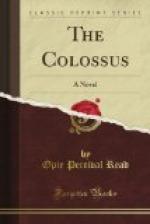“That may be,” Richmond replied, “Many a hero has sprung from this land; these meadows have many times been mowed by men who went away to reap and who were reaped at Gettysburg.”
After a time they went out in the boat again, and were on the water when the sun lost its splendor and, hanging low, fired the distant wood-top. And now there was a hush as if all the universe waited for the dozing day to sink into sounder sleep. The sun went down, a bird screamed, and nature began her evening hum.
In the darkness they lost the path that led through the woods. They made an adventure of this, and pretended that they might not find their way out until morning. They wandered about in a laughing aimlessness, and there was a tone of disappointment in Richmond’s voice when he halted and said, “Here’s the road.”
They went to bed in the farmer’s spare room, where the subscription book, flashing without and dull within, lay on the center table. A plaster-of-paris kitten, once the idol of a child whose son now doubtless lay in a national burial-ground, looked down from the mantel-piece. There was the frail rocking-chair that was never intended to be sat in, and on the wall, in an acorn-studded frame, was a faded picture entitled “The Return of the Prodigal.”
Richmond was sinking to sleep when Henry called him.
“What is it?”
“I didn’t know you were asleep.”
“I wasn’t. What were you going to say?”
“Oh, nothing in particular—was just going to ask what you think of a man who lives a lie?”
“I should think,” Richmond answered, “that he must be a pretty natural sort of a fellow.”
CHAPTER XXX.
A MOTHER’S REQUEST.
At dinner, the evening after Henry had returned from the country, Ellen caused her mother to look up by saying that Miss Miller’s chance was gone.
“What do you mean?” Mrs. Witherspoon asked. “I wasn’t aware that Miss Miller ever had any chance, as you are pleased to term it. But why hasn’t she as much chance now as she ever had?”
“Because her opportunity has been killed.”
“Was it ever alive?” Henry asked.
“Oh, yes, but it is dead now. Mother, you ought to see the young woman I saw at Henry’s office the other day. Look, he’s trying to blush. Oh, she’s dazzling with her great blue eyes.”
Mrs. Witherspoon’s look demanded an explanation.
“Mother,” said Henry, “she means our book-reviewer.”
“I don’t like literary women,” Mrs. Witherspoon replied, with stress in the movement of her head and with prejudice in the compression of her lips. “They are too—too uppish, I may say.”
“But Miss Drury makes no literary pretensions,” Henry rejoined.
“I should think not,” Ellen spoke up. “I didn’t take her to be literary, she was so neatly dressed.”
“When you cease so lightly to discuss a noble-minded girl—a friend of mine—you will do me a great favor,” Henry replied.




